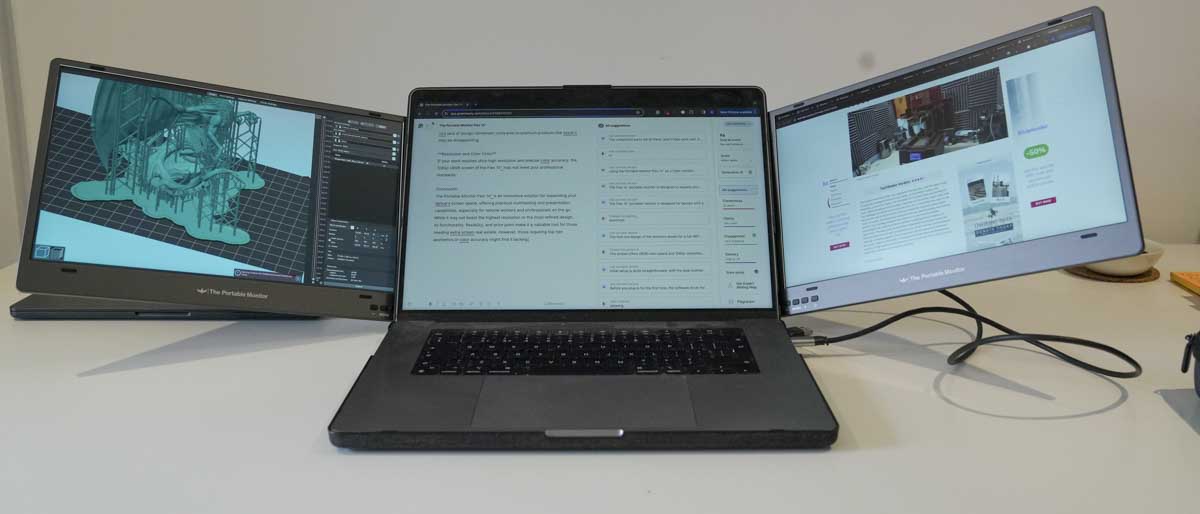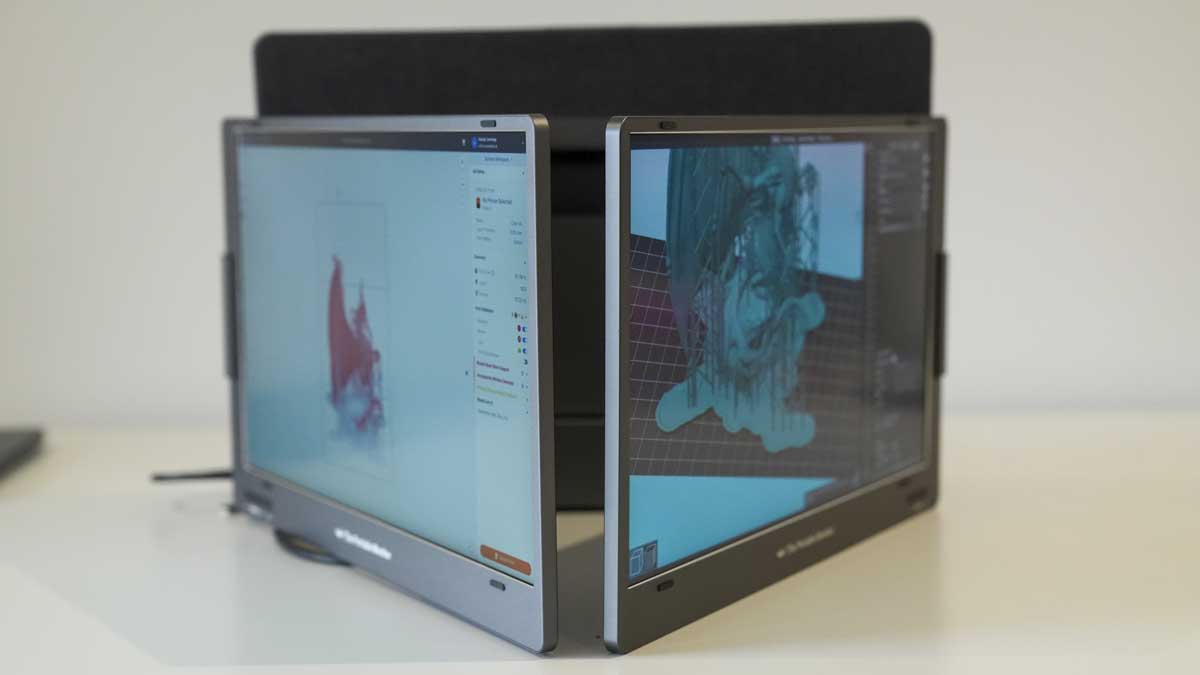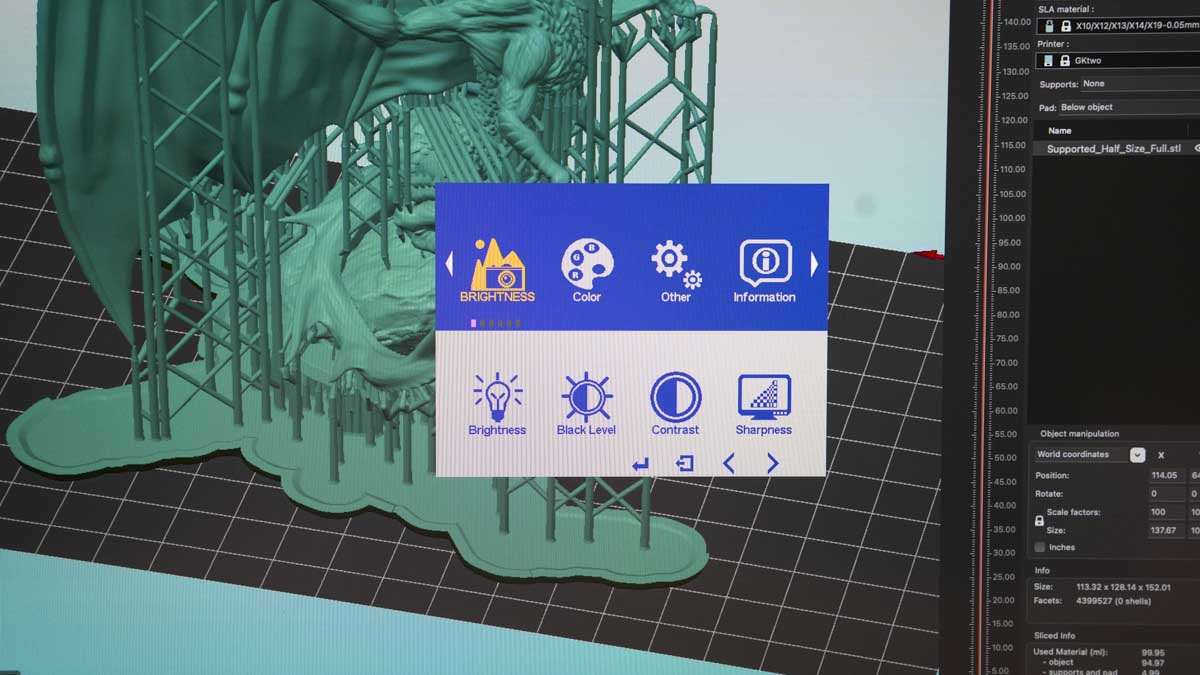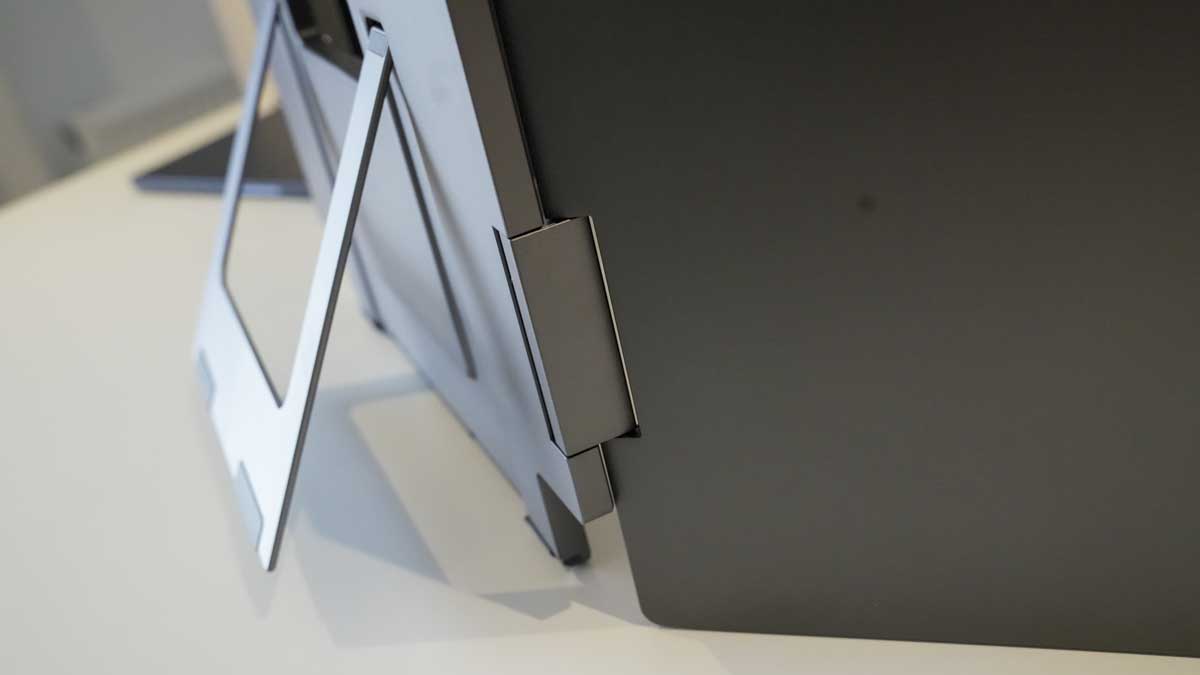
The Portable Monitor Flex 14in: One-minute review
One of the biggest issues with working on a laptop is the relatively small screen size. Even with a larger 16" screen, the actual real estate quickly disappears as soon as you open more than one window or app. The solution is The Portable Monitor Flex 14in, which is quite unlike any other compact portable monitor.
Firstly, the build quality is designed to partly match the space grey and metal casing of the best MacBook Pro laptops, a design also reflected in many PC laptops. However, while it tries to blend in colour and material with Apple's design ethos, it doesn't quite match the quality of Apple's product design. That's not to say it's not well-made; it's just not as refined as you'd expect from an Apple product
However, it is ingenious. It has dual monitors that fold out on either side of your MacBook 14in or any other laptop, as long as the laptop has a USB Type-C port to connect the display. The power and monitor cable are combined, and if you need extra power, a second USB Type-C port on the monitor allows you to connect it directly to a portable power source or a wall socket.
On the first run with the monitor, a few drivers are needed to ensure the smooth operation of the monitors. Thankfully, The Portable Monitor includes a USB key with all the drivers needed for Mac, PC, and Android, as well as cables.
Once installed, you can connect the monitor and run both monitors from that single cable. This setup does increase the drain on your battery, but you can plug in an external power source if needed.
The OSD menu offers many adjustments over brightness, contrast, sharpness, and other settings. You can also adjust directly through your normal computer settings.
We've tested plenty of the best monitors for MacBook Pro, and we can say the quality of the display is excellent in use. On the other hand, this needs to be considered a secondary and tertiary display, especially for MacBooks with their P3 color space and high resolutions. However, the display quality is great and ideal for positioning palettes, browsers, Word documents, and music players that usually get hidden away.
The other major benefit is the articulation of the screens, allowing you to position them in a triangle, so if you're in a meeting, you can flip the screens around so that people on your left and right can see what you're discussing.
Overall, it's a great product, not quite as refined in design as some of the best portable monitors we've tried, and the displays should be seen as secondary if you work in the creative sector due to the 1080p resolution and maximum sRGB colour space. However, when it comes to functionality, especially for expanding your workspace and whenever you need to show what you're doing to others, the flexibility in the positioning of the monitors and the increased workspace is a huge benefit.
The Portable Monitor Flex 14in: Pricing and availability
- How much does it cost? $599 / £476
- When is it available? Now
- Where can you get it? It is available for sale in the US, UK and Australia
The Portable Monitor Flex 14in is widely available and can be brought directly from the official website.

The Portable Monitor Flex 14in: Specs
The Portable Monitor Flex 14in: Build and Handling
Designed as a fold-out monitor system to complement your laptop, the Portable Monitor Flex 14in consists of three sections that fold out, with two monitors attached to a central stand.
The whole unit is made from decent-quality metal that reflects that of the Space Grey MacBook Pros. The build is solid enough, with thick hinges on the monitors that enable the screens to adapt to laptops from 13" to 16" without issue, even though the monitor is designed for 14" screened laptops.
While the overall build is good, there's a lack of precision, and the finesse of good product design seems to be missing. The component parts are all there, and it does work well, but when folded, there's space and flex between each of the folded sections where you really feel it should all lay flat. Likewise, the metal stand that folds out is good and solid, but again, there's some flex when it's packed away rather than sitting flush in its recess.
In use, the stand folds out, and then the two monitors fold out so that a laptop can be slipped in between the two monitors. The large hinges can then be adjusted to accommodate the size of the monitor that your laptop has. Once all is in position, the USB cable can be attached directly to power and connect the laptop to the monitor.
While these days we're used to plug and play, it should be noted that before this monitor system can be used, you'll need to install the drivers. Thankfully, these come in the box with the monitor and take only a few moments to install. Once in place, you can then plug in the monitor and start to configure the screens as needed. On a Mac, this involves delving into the screen options and arranging the monitors so that one sits on the left and the other on the right of the laptop screen, all nice and easy.
Using the Portable Monitor Flex as a triple monitor system is just one use for this device. An equally useful use is in meetings where others need to view your screen. Rather than crowding around, you can fold the Portable Monitor Flex 14in into a triangle of monitors behind your laptop screen, meaning that if you and your colleagues are sitting around a table, you can all view what's going on. Effectively, then, it's one of the best monitors for a dual set-up (or even a triple set-up).
Finally, if you just need one monitor rather than two, a quick tap of the mode button allows you to switch one of the screens off or position it in portrait orientation, which can be useful for reviewing documents and content online.

The Portable Monitor Flex 14in: Performance
The initial setup is quite straightforward, with the dual monitor folding out and supported by the stand at the back. The design allows for several usage configurations: as an extension of your laptop's screen with one on either side, as a triangle of screens behind your laptop screen for others to view your work, or as a single vertical or horizontal screen.
Each configuration can be quickly switched between, with the metal build and large solid hinges providing plenty of flexibility for easy adjustment and positioning. Before you plug in for the first time, the monitor's software driver needs to be installed. This one-time procedure takes just a couple of minutes and is extremely straightforward, although it is unusual in today's plug-and-play environment.
As you switch between the different configurations, the screen modes can be selected using the on-screen displays, with = and + symbols on each monitor, allowing you to adjust and change the settings as needed. Likewise, all the usual options and settings are available through the laptop's OS. By default, the monitors are set to a low resolution, so increasing this to the maximum 1080p is one of the first adjustments that should be made.
Once set up, the screens perform well with a clear, crisp image and plenty of adjustment over the colour and tone. Although the monitor can only display sRGB, it can be adjusted to match well with the MacBook Pro's monitor. However, the quality of the output means they are great for office documents, browsing the internet, and displaying palettes. Still, they should be avoided for tasks requiring precise colour or tone adjustments.
Overall, the monitors are easy to use, and the additional workspace is definitely a huge advantage. However, if you're considering this as a screen extension for use on a train, the size—both packed away and when folded out and in use—is a bit obstructive. This solution is more suited for hot desking, moving between offices, or having meetings where flexibility is needed. They're a great idea and work well in the right environments. The screen quality is good but should not be seen as on par with a P3 high-resolution MacBook screen. These are fine for document review and screen expansion but not for tasks that require absolute colour accuracy.

Should I buy the The Portable Monitor Flex 14in?
The initial idea of this dual-screen system, which sandwiches your laptop screen between two 14" monitors, sounds and looks great, and in practice, it does work well. However, while the quality of the materials and manufacturing is good, the precision of the product design is somewhat lacking, and this is something that carries through in its use.
Unlike many devices that are simply plug and play, this monitor requires drivers to be installed for use, an unusual step in today's world. However, once the drivers are installed, everything else is straightforward with an easy setup and connection.
In use, these monitors really come into their own, and through the test, I've used them to display emails, music, palettes, and 3D slicer applications, while I've used the main laptop screen for tasks that require color accuracy and higher resolutions.
The fact that these have a color space of sRGB and a maximum resolution of 1080p isn't an issue in practice, and the extra screen space they provide is a huge benefit for all sorts of situations. However, the size and design of the Flex 14" portable monitor mean that these are not something I would use on a day-to-day basis if I was traveling around or to be used on a train or similar. However, if I was going to a meeting where I knew others would need to see the screen or was hot-desking, then these would be a huge benefit. Overall, it's a great product, with the feeling that a little more finesse in the product design would elevate this to an absolute essential for many.
We tested the best business monitors - and these are our favorites







